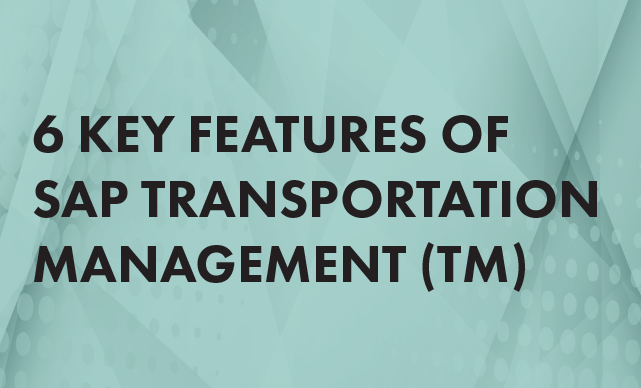
Meet the Experts
Key Takeaways
-
Artificial Intelligence (AI) is not just a buzzword but a transformative force in the realm of supply chain management. Its evolution from a nascent technology to a critical operational tool signifies a new era of efficiency and intelligence in supply chains
-
One of the most powerful applications of AI in supply chain management is predictive analytics which involves analyzing data to forecast potential disruptions and their impacts, allowing companies to implement proactive strategies.
-
By proactively addressing these challenges, businesses can pave the way for successful AI adoption in their supply chains and this strategic approach ensures that companies can leverage AI to enhance efficiency, resilience, and competitiveness.
The global supply chain landscape has been radically transformed by a series of unprecedented disruptions. From the far-reaching impacts of the COVID-19 pandemic to the increasing frequency of climate-related events and geopolitical conflicts, supply chains worldwide are under significant strain. These disruptions expose the vulnerabilities of traditional supply chain models and highlight the critical need for resilience and agility in operations. Businesses across the globe are facing a multitude of challenges, including logistical bottlenecks, fluctuating demands, and escalating costs, which have underscored the imperative for innovative solutions to navigate these turbulent times. This context sets the stage for the exploration of AI-based solutions as a beacon of hope for businesses striving to overcome the complexities of modern supply chains.
The Evolution of AI in Supply Chain Management
Artificial Intelligence (AI) is not just a buzzword but a transformative force in the realm of supply chain management. Its evolution from a nascent technology to a critical operational tool signifies a new era of efficiency and intelligence in supply chains. AI’s spectrum encompasses a variety of technologies, including but not limited to machine learning, predictive analytics, natural language processing, and the Internet of Things (IoT). Each of these technologies contributes uniquely to enhancing supply chain operations. Machine learning algorithms refine demand forecasting, predictive analytics preempt potential disruptions, natural language processing facilitates seamless communication across the supply chain, and IoT ensures real-time visibility and monitoring. Together, they create a synergistic effect that not only mitigates risks but also propels supply chains towards unprecedented levels of optimization and responsiveness.
Integrating AI: Transforming Challenges into Opportunities
AI’s integration into supply chains is transforming industry challenges into opportunities for innovation and growth. Here are the key trends and applications:
Explore related questions
- Predictive Analytics: Forecasting the Unforeseen – One of the most powerful applications of AI in supply chain management is predictive analytics. This involves analyzing data to forecast potential disruptions and their impacts, allowing companies to implement proactive strategies. By leveraging historical data and machine learning, businesses can now predict future demand patterns with remarkable accuracy. This capability is critical for planning and optimizing inventory levels, reducing the risk of stockouts or excess inventory. For example, an AI system can analyze weather data to predict natural disasters, enabling businesses to reroute shipments away from affected areas or adjust inventory levels in anticipation of supply chain disruptions. A notable example is how automotive manufacturers use AI to predict parts shortages caused by supplier disruptions. By analyzing data from various sources, including supplier performance history, current events, and geopolitical risks, companies can identify potential shortages before they occur, allowing for timely adjustments to production schedules and sourcing strategies.
- Real-Time Visibility: Keeping a Finger on the Pulse – The integration of AI with IoT devices has revolutionized tracking and monitoring in supply chains. AI-enhanced IoT devices provide unprecedented real-time visibility into supply chain operations, from warehouse inventory levels to the location and status of shipments. This real-time data enables companies to respond quickly to unexpected changes, minimizing the impact of disruptions. For instance, global logistics companies have implemented AI-driven tracking systems that provide real-time updates on shipment locations and conditions. This allows for dynamic rerouting of shipments in response to delays or disruptions, ensuring timely delivery and high customer satisfaction.
- Automation and Robotics: Redefining Efficiency – Automation and robotics, powered by AI, are transforming warehouse operations. AI-driven robots can pick and pack orders, manage inventory, and even predict future inventory needs, optimizing warehouse efficiency and reducing operational costs. Amazon’s use of robotics in its fulfillment centers is a prime example. The company’s robots automate the picking and packing process, significantly increasing efficiency and reducing the time it takes to process orders.
- Smart Transportation and Logistics Optimization – AI algorithms are instrumental in optimizing routes and delivery schedules. They consider various factors, including traffic, weather conditions, and vehicle capacity, to ensure timely deliveries while minimizing costs.
- Enhanced Supplier Selection and Management – AI tools are being employed to assess supplier reliability, performance, and risk levels. This data-driven approach facilitates better decision-making in supplier selection, contract negotiation, and risk mitigation strategies.
Overcoming the Challenges of AI Implementation
Navigating the path to AI adoption in supply chains presents a series of hurdles that businesses must carefully manage to unlock AI’s full potential. Among these challenges, technical integration, data quality, and the acquisition of skilled talent stand out as particularly daunting obstacles.
- Technical Integration and System Compatibility: One of the most significant barriers to AI adoption is integrating new AI technologies with existing legacy systems. Many supply chain operations rely on older ERP systems that may not seamlessly accommodate modern AI solutions. To address this, companies are increasingly turning to middleware solutions and APIs that act as bridges between old and new systems, ensuring smooth data flow and functionality. Additionally, selecting AI solutions designed with flexibility in mind allows for easier integration with a variety of platforms, minimizing disruption and facilitating a smoother transition.
- Ensuring Data Quality and Accessibility: AI systems are only as good as the data they process. Inconsistent, siloed, or poor-quality data can significantly impair the effectiveness of AI applications. Organizations are tackling this challenge by investing in comprehensive data management strategies. This includes the implementation of standardized data collection methods, regular data cleaning routines, and the development of centralized data repositories that ensure AI models have access to timely, accurate, and relevant data.
- Bridging the Skills Gap: The successful deployment of AI in supply chains also requires a workforce proficient in AI technologies and data analysis. The current market shows a noticeable gap in such skills, posing a challenge for many organizations. Forward-looking companies are addressing this issue through a dual approach: first, by investing in training and development programs to upskill existing employees, and second, by attracting new talent with the requisite AI expertise. This strategy not only enhances the organization’s AI capabilities but also fosters a culture of continuous learning and innovation.
By proactively addressing these challenges, businesses can pave the way for successful AI adoption in their supply chains. This strategic approach ensures that companies can leverage AI to enhance efficiency, resilience, and competitiveness in an increasingly complex global supply chain landscape.
Looking Ahead: The Future of AI in Supply Chains
The future of AI in supply chains is poised at the brink of transformative change, driven by rapid advancements in technology and an ever-increasing demand for efficiency and resilience. As we look ahead, several key trends are set to redefine the landscape of supply chain management, making AI not just an enabler of optimization but a critical component of strategic innovation.
- Deepening Integration of AI and IoT: The symbiotic relationship between AI and the Internet of Things (IoT) will continue to deepen, offering enhanced real-time visibility and predictive capabilities. The future will see IoT devices not only collecting data but also making intelligent decisions on the fly, powered by edge computing and AI algorithms. This evolution will significantly reduce reaction times to supply chain disruptions, further enhancing agility and resilience.
- Advancements in Autonomous Logistics: The progression towards fully autonomous logistics is on the horizon. Self-driving vehicles, drones, and automated shipping vessels will revolutionize delivery and transportation methods. AI’s role in orchestrating these autonomous systems will ensure optimal routing, reduce human error, and lower operational costs, while also mitigating the impact of labor shortages.
- Sustainable Supply Chain Practices: As global emphasis on sustainability intensifies, AI will play a pivotal role in enabling greener supply chain practices. Through advanced analytics and simulation models, AI will help companies identify and implement strategies that minimize environmental impact, from reducing carbon emissions through optimized routing to enhancing energy efficiency in warehouses and distribution centers.
- Collaborative AI Ecosystems: The future will witness the emergence of collaborative AI ecosystems, where data and insights are shared across organizations and industries. This collaborative approach will break down traditional silos, fostering a more interconnected and transparent supply chain network. It will enable businesses to respond more dynamically to market changes and disruptions, leveraging collective intelligence to drive decision-making.
In embracing these future developments, businesses will not only navigate the challenges of today’s global supply chain landscape but also shape a new era of supply chain management that is more resilient, efficient, and aligned with broader societal values. The journey towards AI-driven supply chain innovation is just beginning, and its potential to transform the global economy is immense.







